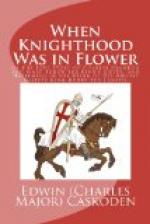“What will you do for him, brother?” said Mary, not wanting to give the king’s friendly impulse time to weaken.
“Oh! don’t bother about that now,” but she held him fast by the hand and would not let go.
“Well, what do you want? Out with it. I suppose I might as well give it up easily, you will have it sooner or later. Out with it and be done.”
“Could you make him Duke of Suffolk?”
“Eh? I suppose so. What say you, my Lord of York?”
York was willing—thought it would be just the thing.
“So be it then,” said Henry. “Now I am going out to hunt and will not listen to another word. You will coax me out of my kingdom for that fellow yet.” He was about to leave the room when he turned to Mary, saying: “By the way, sister, can you have Brandon here by Sunday next? I am to have a joust.”
Mary thought she could, ... and the great event was accomplished.
One false word, one false syllable, one false tone would have spoiled it all, had not Mary—but I fear you are weary with hearing so much of Mary.
So after all, Mary, though a queen, came portionless to Brandon. He got the title, but never received the estates of Suffolk; all he received with her was the money I carried to him from France. Nevertheless, Brandon thought himself the richest man in all the earth, and surely he was one of the happiest. Such a woman as Mary is dangerous, except in a state of complete subjection—but she was bound hand and foot in the silken meshes of her own weaving, and her power for bliss-making was almost infinite.
And now it was, as all who read may know, that this fair, sweet, wilful Mary dropped out of history; a sure token that her heart was her husband’s throne; her soul his empire; her every wish his subject, and her will, so masterful with others, the meek and lowly servant of her strong but gentle lord and master, Charles Brandon, Duke of Suffolk.
Note by the Editor
Sir Edwin Caskoden’s history differs in some minor details from other authorities of the time. Hall’s chronicle says Sir William Brandon, father of Charles, had the honor of being killed by the hand of Richard III himself, at Bosworth Field, and the points wherein his account of Charles Brandon’s life differs from that of Sir Edwin may be gathered from the index to the 1548 edition of that work, which is as follows:
CHARLES BRANDON, ESQUIRE,
Is made knight,
Created Viscount Lysle,
Made duke of Suffolke,
Goeth to Paris to the Iustes,
Doeth valiantly there,
Returneth into England,
He is sent into Fraunce to
fetch home the French quene into England,
He maryeth her,
and so on until
“He dyeth and is buryed
at Wyndesore.”
No mention is made in any of the chronicles of the office of Master of Dance. In all other essential respects Sir Edwin is corroborated by his contemporaries.




